In 1888, a Johnson City newspaper correspondent wrote an article for the paper describing the condition of the city that year. “This ends the year in this locality and we will try to sum up the items of most interest. We had three elections, one in March to elect a mayor and aldermen, another in August to elect county officers and one in November to appoint state and national officials.”
The journalist went on to say that much energy had been expended about the upcoming of what he called the great and coming 3C's railroad than everything else put together.
The writer noted that two deaths had occurred in the city: the stabbing of a man and a train accident involving a young lady. The report included 22 serious but non-life threatening injuries from machinery, clubs, pistols, knifes, falling off logs, kicked by mules and the like. There were also 32 residents who died from sickness and old age.
The city had a July 4th celebration comprised of an unlimited number of opera and other public entertainment. A significant number of police were on hand to maintain order; several arrests were made on various unspecified charges. News surfaced that 21 persons were poisoned at area boarding houses. During the festivities, a riot occurred but without the shedding of a single drop of blood.
During that year, Johnson City boasted of having no destructive fires or any financial failures of businesses. The success of merchants was credited to the doubling of factories and an increase in population and buildings. The Watauga Bank opened and The Bank of Johnson City was turned into the First National Bank of Johnson City, with a telephone connection to Jonesboro. The city's two hotels, the Piedmont and the Watauga, did a sizable business under the management of Weiler and Dickinson.

Three Old Johnson City Advertisements from 1888
Horton, Yocum & Co. began to enlarge the city's Steam Tannery. A contract was awarded for extensive water works to be installed by J.J. Robinson and others. Electric lights were installed over most of the city. Wide streets and avenues were opened up and older ones greatly improved.
Although real estate sales bought in $130,000, more land was desired at even higher prices. Churches were well-supplied with pastors and small congregations. The six existing schools did well despite the fact that the Board of Education did not appropriate public money for them that year.
Another hot topic dealt with the making of money for Johnson Citians. How to make money was a problem well-studied by the folks. It was a question that everybody wanted solved. The paper offered some suggestions:
“So to begin with, we say that most people can make money, but how to save it after it is made is really the question that troubles most people. The real problem with all of us is how shall we accumulate this much coveted wealth rather than how shall we make it.
“So now, we suggest a few points. Don't try to keep up in style and appearance with your rich neighbor. Do not hire someone to do work for you if you have the time and strength to do it yourself. Do not ride or drive fast horses just because it is fashionable when you know your income's too small for you to afford the pleasure.
“Do not smoke 15-cent cigars when cheaper one would do, in fact when none at all would be better. Do not waste your means by any kind of extravagance, large or small. Pay for what you buy. Owe no man anything.”
The paper ended its counsel with a plug for a local business: “And, last but not least, trade with Christian Hoss and Hodge in 1889 and secure the best goods for the least money.” An examination of old newspapers from this era reveals that publishers frequently interspersed advertisements along with news.
